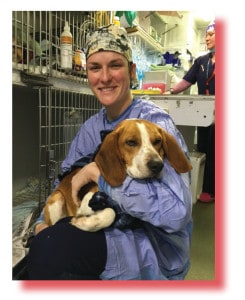By Jeff Ashin, CEO, Young-Williams Animal Center. Photo by: Young-Williams Animal Center
Pet owners face many day-to-day decisions that affect the health and welfare of the animals they love. What kind of food is best? How much food? What kind of exercise will be most beneficial? However, the most important decision pet owners face affects not only the pet, but the community as well.
Each year, millions of healthy, adoptable pets in the United States end up in animal shelters. The numbers are staggering – according to the American Society for the Prevention of Cruelty to Animals (ASPCA), there are 70 million stray cats living in the United States. There are 13,600 estimated animal shelters nationwide. 7.6 million companion animals enter animal shelters every year. And sadly, approximately 2.7 million animals are euthanized each year.
The decision to spay/neuter is the most humane way to control animal overpopulation. Since July 2007, Young-Williams Animal Center has provided more than 50,000 low-cost spay and neuter surgeries for the general public. This was made possible in the beginning by a five-year grant from the Aslan Foundation whose goal was to reduce euthanasia in the shelter through the use of the mobile Spay Shuttle program. Because of the high demand for this service, Young-Williams added a stationary spay/neuter clinic to the program in January 2012.
Depending upon their size, some puppies and kittens may be safely sterilized when they’re as young as eight weeks old. In fact, puppies and kittens recover more quickly from surgery than do adult dogs and cats.
Besides not being able to reproduce, the benefits of spay/neuter surgeries are many. The surgeries prevent ovarian or uterine cancer and prevent uterine infections in females, and both sexes are less likely to fight with other animals. Neutered males are less likely to mark territory by urinating, will not get testicular tumors, will have less prostate inflammation, and will exhibit less inappropriate sexual behavior.
Just as the benefits of spay/neuter are many, the myths about the surgeries are plentiful. Animals do not become fat and lazy after being altered. While it is true that an animal’s metabolism may slow after a spay/neuter surgery, monitoring food intake and adjusting as needed can counter the slower metabolism.
Altered dogs will not become passive when it comes to being protective of their surroundings. They will remain instinctually territorial and protective of their owners’ homes. The only behaviors that will change are those controlled by the sex hormones.
Perhaps the most popular myth concerning spay/neuter surgeries is that they are too expensive to be practical. The truth is a spay/neuter surgery is a one-time cost that can save pet owners from significant medical expenses because of certain health problems over the course of an animal’s life. In addition, Young-Williams works to offer assistance programs to the community for spay/neuter solutions. For those who can afford more than they are asked to pay, Young-Williams asks that a donation be made to assist other spay/neuter surgeries.
Call Young-Williams’ Spay/Neuter Solutions at (865) 215-6677 to schedule a spay/neuter appointment or visit http://www.young-williams.org/spay-neuter-your-pet/ for more information. It’s the most important decision you can make for your pet.visit www.young-williams.org/homeforholidays.
 Jeff Ashin is the CEO of Young-Williams Animal Center, a 501 (c)(3) not-for-profit animal welfare organization and the official shelter for Knoxville and Knox County. The center offers pet adoption at two locations and affordable spay/neuter solutions. For more information call 865-215-6599 or visit www.young-williams.org
Jeff Ashin is the CEO of Young-Williams Animal Center, a 501 (c)(3) not-for-profit animal welfare organization and the official shelter for Knoxville and Knox County. The center offers pet adoption at two locations and affordable spay/neuter solutions. For more information call 865-215-6599 or visit www.young-williams.org
Related posts
Newsletter Subscribe
Newest Posts
Set Up a Parental Control for Online Safety
Have you ever wondered how long your children spend in front of a device without your supervision? Yes, it is…
Adopt A Life, Save A Life
By Jeff Ashin, CEO, Young-Williams Animal Center. Photo by: Young-Williams Animal Center Are you or your child thinking of adding…


